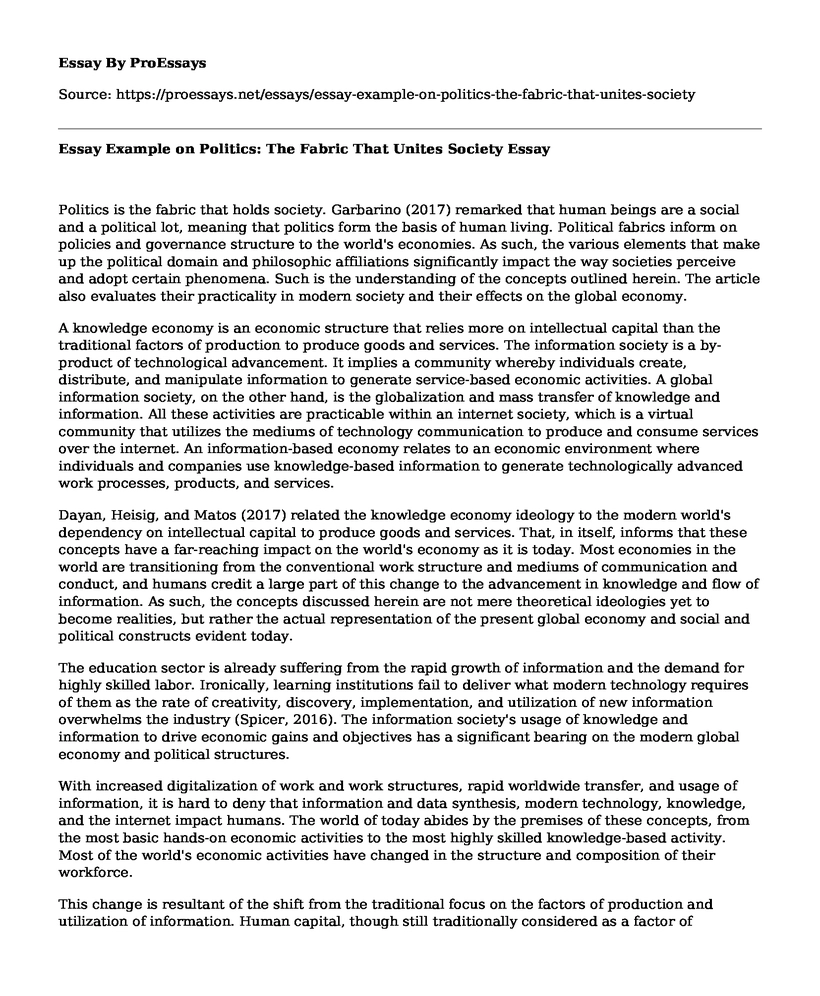Politics is the fabric that holds society. Garbarino (2017) remarked that human beings are a social and a political lot, meaning that politics form the basis of human living. Political fabrics inform on policies and governance structure to the world's economies. As such, the various elements that make up the political domain and philosophic affiliations significantly impact the way societies perceive and adopt certain phenomena. Such is the understanding of the concepts outlined herein. The article also evaluates their practicality in modern society and their effects on the global economy.
A knowledge economy is an economic structure that relies more on intellectual capital than the traditional factors of production to produce goods and services. The information society is a by-product of technological advancement. It implies a community whereby individuals create, distribute, and manipulate information to generate service-based economic activities. A global information society, on the other hand, is the globalization and mass transfer of knowledge and information. All these activities are practicable within an internet society, which is a virtual community that utilizes the mediums of technology communication to produce and consume services over the internet. An information-based economy relates to an economic environment where individuals and companies use knowledge-based information to generate technologically advanced work processes, products, and services.
Dayan, Heisig, and Matos (2017) related the knowledge economy ideology to the modern world's dependency on intellectual capital to produce goods and services. That, in itself, informs that these concepts have a far-reaching impact on the world's economy as it is today. Most economies in the world are transitioning from the conventional work structure and mediums of communication and conduct, and humans credit a large part of this change to the advancement in knowledge and flow of information. As such, the concepts discussed herein are not mere theoretical ideologies yet to become realities, but rather the actual representation of the present global economy and social and political constructs evident today.
The education sector is already suffering from the rapid growth of information and the demand for highly skilled labor. Ironically, learning institutions fail to deliver what modern technology requires of them as the rate of creativity, discovery, implementation, and utilization of new information overwhelms the industry (Spicer, 2016). The information society's usage of knowledge and information to drive economic gains and objectives has a significant bearing on the modern global economy and political structures.
With increased digitalization of work and work structures, rapid worldwide transfer, and usage of information, it is hard to deny that information and data synthesis, modern technology, knowledge, and the internet impact humans. The world of today abides by the premises of these concepts, from the most basic hands-on economic activities to the most highly skilled knowledge-based activity. Most of the world's economic activities have changed in the structure and composition of their workforce.
This change is resultant of the shift from the traditional focus on the factors of production and utilization of information. Human capital, though still traditionally considered as a factor of production, has changed focus to lean on intellectual prowess rather than physical labor considerations (Caruso, 2016). It is true that the world has changed, and that the reality of the concepts discussed herein is evident in global affairs. Local political issues now have a worldwide presence and impact diverse nationalities due to globalization and technology, and this, in turn, affects the global economy.
References
Caruso, L. (2016). The 'knowledge-based economy' and the relationship between the economy and society in contemporary capitalism. European Journal of Social Theory, 19(3), 409-430 https://doi.org/10.1177%2F1368431015611297
Dayan, R., Heisig, P., & Matos, F. (2017). Knowledge management as a factor for the formulation and implementation of organization strategy. Journal of Knowledge Management. https://doi.org/10.1108/JKM-02-2016-0068
Garbarino, J. (2017). Children and families in the social environment. Transaction Publishers.
Spicer, A. (2016, May 18). The knowledge economy is a myth. We don't need more universities to feed it. The Guardian. Retrieved from https://www.theguardian.com/commentisfree/2016/may/18/knowledge-economy-myth-more-universities-degree
Cite this page
Essay Example on Politics: The Fabric That Unites Society. (2023, May 23). Retrieved from https://proessays.net/essays/essay-example-on-politics-the-fabric-that-unites-society
If you are the original author of this essay and no longer wish to have it published on the ProEssays website, please click below to request its removal:
- Paper Example on CIA Intelligence Cycle
- Speech Analysis Essay on Presidents Obama Speech at the Interfaith Prayer Service in Newtown
- Research Paper on Rise to Prosperity in Taiwan Since 1982
- Essay on Trump's Quest to Restore America's Greatness: 2018 Trade & Manufacturing Policy
- Essay Example on Armenian Genocide: 600,000-1.5 Million Lives Lost, Turkish Denial
- Paper Example on Illinois: Home to America's First Black President
- Fostering Private-Public Partnerships: The People Concern's Mission to Address Social Challenges - Free Paper







